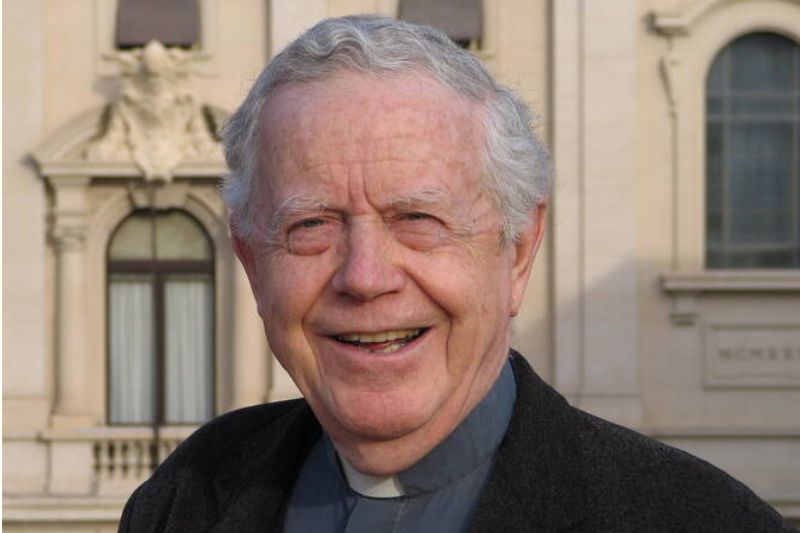Fr Gerald O’Collins SJ AC was a giant and a gentleman. He was a significant figure in the Catholic Church both in Australia and globally. For 32 years he taught theology at the Gregorian University in Rome, where he was Dean for six years. Fr Gerry was a prolific writer, publishing about 80 books and countless articles. He was gregarious and engaging, warm and ever charming.

Fr O’Collins died on Thursday, 22 August in Melbourne. He was 93 years old.
I had the great privilege of living with Gerry in 2019 and 2020. He was a joy to live with. Along with others in the Faber Community in Parkville, Gerry showed me it was possible to live a full and rich Jesuit life right the way through. Fuller obituaries will come in the days ahead, I hope in these pages and no doubt elsewhere. This is a brief acknowledgment of a man with whom I lived and who showed me great generosity.
Until his last days, Fr Gerry had publishing projects. He thrived in the world of ideas. When I lived with him he was always interested in what I was up to. He was interested to hear about what I, and other younger Jesuits, were studying, thinking about and what we were noticing in the culture.
In our community, amongst men much younger than he, he was probably hardest hit by the Covid-lockdowns. Gerry had such a full social calendar. He met friends each week for lunch, attended lectures in theology, classics and the arts, delighted in meals with family at home, or down on Lygon Street in Carlton. He was the center of a regular Saturday night pasta night in our community, and the lockdowns could not take that. With a plate of pasta, some good bread and olive oil, a glass of red and good conversation, Gerry was in his element.
One night early in the lockdowns Gerry suggested anyone in the community interested might watch a film together. After our first film, Marriage Story, he said to me 'Well, if I’m going to be the President of our little film society, more an honorary role, you’d better be the Secretary.' So, each week in the lockdowns we would watch a relatively contemporary film on Tuesday night and a classic film on Friday. The conversations that flowed over into the following days were a delight, showing the breadth of Gerry’s interests and the depth of his humanity.
Gerry had a wonderful way of making people feel welcome. He wanted to see people at their best and his company allowed others to be so. He put us at ease and deftly averted any unpleasantness in conversation. He had a catalogue of stories, deftly told, often about significant figures. But he was not a name-dropper. The first time I met him he told a story about a Polish cleric whom he had chastised for not being interested in golf. It was only well after that the penny dropped; he had been talking about a lunch with St Pope John Paul II. Gerry’s life was peopled by some of the most significant figures in the global Church, and in political and cultural society more broadly, but he wore those connections lightly.
'Gerry was a person of vitality and wisdom in my life, someone who showed me a way of living with fidelity to God, generosity to others and a sense of seeking ever what is good, true and beautiful.'
His life was peopled fundamentally by Jesus Christ, his Lord and friend, and by His mother, Our Lady. His theology emerged out of a love of scripture and his graciousness, humility and generosity was conditioned by his daily meditation on scripture. Gerry was a prayerful man, deeply contemplative amidst much action.
These are stray thoughts about a man whose life, and influence on me, is anything but stray. This is not necessarily the right forum to farewell a dear companion in the Lord, but I could not imagine writing about anything else today. Gerry was a person of vitality and wisdom in my life, someone who showed me a way of living with fidelity to God, generosity to others and a sense of seeking ever what is good, true and beautiful.
Julian Butler SJ is a Jesuit undertaking formation for Catholic priesthood. He previously practiced law, and also has degrees in commerce and philosophy. Julian is a contributor at Jesuit Communications, a chaplain at Xavier College, and a board member at Jesuit Social Services.